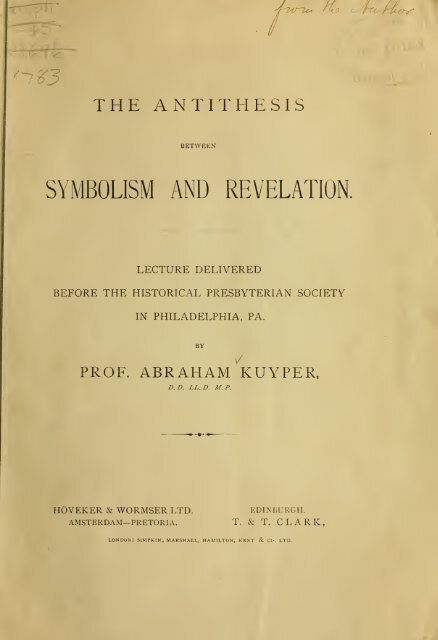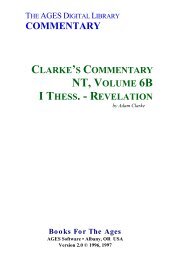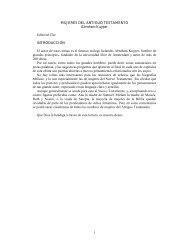Abraham Kuyper - The Antitheses Between Symbolism and Revelation
Create successful ePaper yourself
Turn your PDF publications into a flip-book with our unique Google optimized e-Paper software.
THE ANTITHESIS<br />
BETWEKN<br />
SYMBOLISM AND REVELATION.<br />
LECTURE DELIVERED<br />
BEFORE THE HISTORICAL PRESBYTERIAN SOCIETY<br />
IN PHILADELPHIA, PA.<br />
BY<br />
/<br />
PROF. ABRAHAM KUYPER,<br />
D. D. LL. D. M. P.<br />
HOVEKER & WORMSER LTD.<br />
EDINBURGH.<br />
AMSTERDAM— PRETORIA. T. & T. CLARK,<br />
LONDON: SIMPKIN, MARSH.\LL, HAMILTON, KKNT & CC'. LTD.
THE ANTITHESIS<br />
SYMBOLISM AND REVELATION.
THE ANTITHESIS<br />
BETWEEN<br />
SYMBOLISM AND REVELATION.<br />
LECTURE DELIVERED<br />
BEFORE THE HISTORICAL PRESBYTERIAN SOCIETY<br />
IN PHILADELPHIA, PA.<br />
BY<br />
PROF. ABRAHAM ^KUYPER,<br />
D. D. LL. D. M. P<br />
HOVEKER & VVORMSER LTD.<br />
EDINBURGH.<br />
AMSTERDAM—PRETORIA. T. & T. CLARK,<br />
London: simpkin, makshall, Hamilton, kknt, Jb co. ltd.
THE ANTITHESIS BETWEEN SYMBOLISM<br />
AND REVELATION.<br />
Mr. President, Ladies <strong>and</strong> Gentlemen, Availing myself with<br />
much pleasure of the opportunity which your kind invitation puts<br />
in my way, to say a few words to your honoured Society, it is not<br />
my design to give an elaborate lecture, but only to make a few<br />
remarks on a subject that falls within the limits of your interests<br />
<strong>and</strong> mine. This subject is the antithesis between <strong>Symbolism</strong> <strong>and</strong><br />
<strong>Revelation</strong>, or the current of symbolical religion, which of late is<br />
becoming almost dominant in Engl<strong>and</strong>, <strong>and</strong> now already in a<br />
considerable degree menaces our Calvinistic church-life.<br />
<strong>The</strong> facts need hardly any proof. All over non-conformistic<br />
Engl<strong>and</strong> there is no end of complaint, that so many of the children<br />
of the second generation are ab<strong>and</strong>oning the paths of their<br />
fathers, <strong>and</strong> are publicly <strong>and</strong> earnestly declaring their preference<br />
for the episcopalian services. In one general assembly after another<br />
one of the chief topics in order has been the ever-returning question:<br />
how to keep the rising generation in the fold. In so much as<br />
you have followed the debates on this question, <strong>and</strong> the resolutions<br />
taken, you also know in what way improvement at times has been<br />
looked for. <strong>The</strong> astonishing proposition to make non-conformism<br />
more attractive,<br />
by connecting with the church a dancing or boxing<br />
school, or a large room for ///door <strong>and</strong> a broad field for c'z^/door<br />
sports, speaks volumes. I remember that two years ago a Con-
gregational minister touched a different chord, when he pointed his<br />
audience to the Calvinists in Wales <strong>and</strong> in Holl<strong>and</strong>, who, in keeping<br />
more closely to their st<strong>and</strong>ards, had no difficulty whatsoever<br />
in kindling the love for their own churches in the hearts of their<br />
children. But his voice was a voice of one crying in the wilderness,<br />
<strong>and</strong> the uneasy feeling of an approaching ebbtide among<br />
Methodists <strong>and</strong> Congregationalists in Engl<strong>and</strong> is still on the increase.<br />
Even outside the churches in the daily press this reflux<br />
in the general spirit is watched so keenly, <strong>and</strong> this increasing sympathy<br />
for Ritualism is considered to be of so far reaching consequences,<br />
that liberal papers ascribe to it for a large part, the<br />
overwhelming majority which Lord Salisbury secured at the last<br />
elections. For three-quarters of a century, as they frankly acknowledge,<br />
non-conformism had been the stronghold of the Liberals,<br />
<strong>and</strong> it is this remarkable change in the public mind, which, religiously<br />
being more in favor of Ritualism, turns politically to the<br />
advantage of tlie conservatives <strong>and</strong> unionists. <strong>The</strong> interesting coming<br />
forward of the unionists under Mr. Chamberlain was no doubt<br />
incidentally brought about by Mr. Gladstone's persevering support<br />
of home-rule, but was countenanced, as they tell us, in no small<br />
proportion by this same ritualistic movement. In the long run<br />
our human mind cannot forsake its oneness of impulse. <strong>The</strong> track<br />
which it beats in matters of religion, is almost spontaneously followed<br />
in social <strong>and</strong> political affairs. So much to convince you<br />
that this symbolical movement, if it carries the day, far from being<br />
a mere trifle in church-life, is on the contrary impregnated by an<br />
energetic principle, which menaces to react upon our whole human<br />
existence <strong>and</strong> upon the whole history of the world.<br />
<strong>The</strong> second stage of this movement (for I emphasize that ecclesiastically<br />
it has three stages) is to be observed in the Episcopal<br />
church itself. In the first period the thirst of the non-conformistic<br />
renegade after more artistic worship is duly satisfied by the plainest<br />
service conducted by a low-church minister. But for the church<br />
of Engl<strong>and</strong> people, things are very differently conditioned. <strong>The</strong><br />
same attraction which the low-church is exercising upon a faltering<br />
<strong>and</strong> wavering non-conformist, the episcopalian himself undergoes
from the so-called high-church movement. <strong>The</strong> common prayerbook<br />
seems to them a dull sailing with quartering winds, or better<br />
still, a display of the flag at halfmast. <strong>The</strong> thirst for symbolism<br />
once felt is not quenched by half measures. <strong>The</strong> more such a<br />
passion is indulged in, the more it is aggravated. Thus from the<br />
low-church they stepped over into the high-church, <strong>and</strong> here they<br />
found the clergy <strong>and</strong> the bishop almost constantly engaged in<br />
rivalry to go still higher on, the highest also in this ritualistic<br />
competition always having the lead. I visited Engl<strong>and</strong>, <strong>and</strong> I attended<br />
the episcopal services, twenty years ago, <strong>and</strong> I found that<br />
what was considered very high a quarter of a century ago, is now<br />
already in some circles most disdainfully condemned as being behindh<strong>and</strong>,<br />
if not a derision of the sanctuary. Almost every year a new<br />
item is added to the overburdened services, <strong>and</strong> no one can foretell,<br />
where finally this display of ritualistic inventiveness will stop.<br />
Fully aware of the danger that lurks behind all these paraphernalia<br />
Sir William Harcourt made an impressive <strong>and</strong> cogent speech,<br />
as you know, upon this matter in the House of Commons, <strong>and</strong><br />
recommended that it should be thwarted by government; as if a<br />
deep spiritual movement could ever be checked by the executive<br />
power, <strong>and</strong> as if in such a case anything short of the reaction of<br />
the opposite spiritual principle could change the mind of the people.<br />
Now there is finally the third stage, which this ritualistic action<br />
must of necessity develop for itself; viz., tJie going back to Rome.<br />
According to the Roman Catholic weeklies every month more than<br />
one thous<strong>and</strong> church-of-Engl<strong>and</strong> people are making the decisive<br />
step. And this is quite natural. In every race there being a goal,<br />
the human mind cannot rest before this goal is reached; <strong>and</strong> this<br />
goal in Ritualism is presented in the most harmonious <strong>and</strong> perfect<br />
form by the Roman Catholic Liturgical performances. <strong>The</strong>re you<br />
find the ripe fruit of a ritualistic development, of more than a twelve<br />
centures st<strong>and</strong>ing. At this point Rome is not to be surpassed.<br />
Every particular in which the high churchmen are indulging themselves,<br />
is stealthily borrowed from her treasures. With Rome is<br />
the original, theirs is the apery <strong>and</strong> mimicry. What I called 'in-<br />
'<br />
ventiveness in the second stage, here evidently appears to be noth -
8<br />
ing but mere imitation of the Romish pattern. Or if you like<br />
another simile, the high churchman carries a ritualistic bouquet,<br />
but the ritualistic rose-bush buds <strong>and</strong> blossoms under the shade<br />
of the<br />
Vatican.<br />
Such is the condition of things in Engl<strong>and</strong>. In Scotl<strong>and</strong>, in<br />
your Eastern States, in the Netherl<strong>and</strong>s, in South Africa, in fact,<br />
wherever the spirit of Calvin won a more thorough, more absolute<br />
<strong>and</strong> more permanent victory, this movement still stumbles <strong>and</strong><br />
totters in its first stage. <strong>The</strong> voice that speaks from the blood<br />
of the martyrs is not stifled at once. It would, however, be closing<br />
your eyes against the reality to deny that, as the white ant,<br />
it has succeeded already in piercing also our walls <strong>and</strong> commencing<br />
its destructive work. Although very rarely, apostacies have<br />
occurred. Preaching, before all things, should be short. <strong>The</strong> differences<br />
between one denomination <strong>and</strong> another should be obliterated.<br />
In religious geology the dogmatical stratum should be<br />
underground <strong>and</strong> very thin. <strong>The</strong> common mind refuses to be<br />
wearied by such antiquated documents as confessions <strong>and</strong> catechisms.<br />
At this point the breach between parents <strong>and</strong> children<br />
is becoming wider <strong>and</strong> wider, with each succeeding generation.<br />
And especially among the more cultured classes the dem<strong>and</strong> is<br />
more <strong>and</strong> more general for beautiful church-buildings, with lofty<br />
steeples <strong>and</strong> high spires, for dominating organ music, <strong>and</strong> for<br />
exquisite choirs <strong>and</strong> soloist's. Here <strong>and</strong> there these artistic requirements<br />
in every particular of the service are even pressed in a<br />
much more urgent way than the soundness of the Apostolic<br />
truth.<br />
I do not want to exaggerate, <strong>and</strong> therefore I willingly add,<br />
that there are not a few important assets that counterbalance these<br />
liabilities. Christian liberality as it is exercised in our days was<br />
entirely unknown in the first half of this century. A spirit ot<br />
reciprocal estimation has succeeded to the squabbles <strong>and</strong> jealousies<br />
of former days. <strong>The</strong> theological hatred, if not entirely put<br />
out <strong>and</strong> stifled, is glowing in mere embers. And, above all, there<br />
is an increase of personal <strong>and</strong> of combined activity in the missionary,<br />
the philanthropic, <strong>and</strong> the hospital domains, far exceeding
what has been achieved in the most glorious days of our fathers.<br />
Gains so highly valuable in my eye that, were the symbolical<br />
sympathies outside the boundaries of our own churches an isolated<br />
movement, I should feel inclined to connive temporarily at the<br />
lack of love for the Truth, accepting the assets, which I mentioned^<br />
as the prognostics of better times to come, <strong>and</strong> as fully counterbalancing<br />
the black points.<br />
This however is impossible. Two, three drops falling from a<br />
little cloud, passing just over your head, will not disturb you.<br />
But if lifting up your eye, you discern from all sides much thicker<br />
<strong>and</strong> darker clouds gathering on the horizon, now <strong>and</strong> then rent<br />
already by a flash of lightning, you feel at once the approaching<br />
danger, <strong>and</strong> the two little drops become a serious warning. So<br />
now it is here. <strong>The</strong>re exists an undeniable affinity between the,<br />
as yet, feeble symbolical action in our own churches <strong>and</strong> the dark<br />
ritualistic cloud pending over Great Britain. Both have a common<br />
origin. <strong>The</strong>y are, the one as well as the other, the issue of a<br />
remarkable change in the common sentiment. And without the<br />
least danger of being disclaimed by the events as a false prophet,<br />
you may predict, that what is now seen elsewhere, is only the<br />
true image of what is awaiting yourselves. <strong>The</strong> same cause, if<br />
allowed to exert its full energy, is always bound in the end to<br />
yield identical results. <strong>The</strong>re are local changes, not affecting the<br />
world outside. But as soon as, like here, a tiniversal movement<br />
has set in, springing forward from the very entity of the human<br />
soul, you know beforeh<strong>and</strong> that it must become general, <strong>and</strong> that<br />
it shall certainly find its way, digging its own bed like a torrent<br />
rushing down from the mountain-sides. In serious matters none ot<br />
us here should like to be childish, <strong>and</strong> childish it would be, not<br />
to realize at once the inner connection between the general increase<br />
of love of the symbolical in literature, in painting, in sculpture,<br />
in service of worship outside our own churches, <strong>and</strong> the clearly<br />
distinguishable changes of religious appreciation bij which no keen<br />
observer can keep from being impressed in our own circles. In<br />
spiritual things also there is an atmosphere permeating the whole<br />
of life. As in the days of our fathers this atmosphere was saturated
10<br />
with a strong anti- symbolical element, just so it is now impregnated<br />
bA^ an ever more strongly distilled tincture of symbolism. A distinct<br />
change, which every thoughtful observer now already fully realizes,<br />
although the bulk of the people, soon accustomed to symbolism's<br />
peculiar fragrance, <strong>and</strong> themselves halfway intoxicated by it, are<br />
not in the least aware how far the scenes have been already shifted-<br />
This ritualistic change, however, is not to be understood as a<br />
supplantation of the religious feeling by the aesthetical. It is not<br />
arl but symbolism (<strong>and</strong> I once more emphasise the expression)<br />
that took hold of the mind ; <strong>and</strong> the true conception of the new<br />
movement lies in the acknowledgement of the fact, that of late<br />
indeed a new religious tide has set in. <strong>The</strong> difference between the<br />
dominating spirit of the end of the former century <strong>and</strong> of ours, is<br />
well marked, in Europe at least, both in Protestant <strong>and</strong> in Roman<br />
Catholic circles. A hundred years ago Voltaire, now de Brunetiere^<br />
gives expression to the French mind in leading classes. And if in<br />
the days of the French convention statesmen <strong>and</strong> belletrists,<br />
scholars <strong>and</strong> politicians, were vying in strong a7iti-rt\\g\o\xs utterances,<br />
now on the contrary an increasing number of eminent men<br />
of paramount influence, both in the university <strong>and</strong> in governmental<br />
circles, are deeming it a point of honour, publicly to declare their<br />
religious sympathies <strong>and</strong> to proclaim their predilections for mystical<br />
piety.<br />
Only it should be observed that this newly-risen predilection<br />
for the religious element is of a very peculiar kind. It is absolutely<br />
devoid of every personal <strong>and</strong> definite character. Both in the days<br />
of the Apostles <strong>and</strong> in the times of the Reformation the revival<br />
of spiritual life originated from a yearning of the heart after the<br />
living God, for salvation <strong>and</strong> for eternal peace. In both instances<br />
the cry of the troubled conscience was: What shall I do to be<br />
saved? Now, on the contrary, no such struggle of the oppressed<br />
soul is witnessed. It is not Augustine confessing: Inquietum cor<br />
meum donee requiescat in Te o Domine, i. e.: My heart remains<br />
unquiet until it can rest in <strong>The</strong>e, O God. It is not Luther creeping<br />
on the stairs of the Vatican for the redemption of his soul. It is<br />
not Calvin, bidding every earnest man <strong>and</strong> woman not to rest
II<br />
before they had discovered the source of their personal redemption<br />
in God's good pleasure. Oh, no! In this new religious tide there is no<br />
dem<strong>and</strong> at all for deliverance from sin ; there is no longing whatsoever<br />
after redemption; nowhere the desire for a conscious personal reunion<br />
with the living God, our Father in heaven, declares itself. <strong>The</strong><br />
adherents of this >iezv rdigioii, belonging almost all to the highly<br />
cultured class, are well satisfied with themselves <strong>and</strong> with their<br />
position in this world, leaving their future lot in the world to<br />
come, if there is such a one, an open question. <strong>The</strong>ir watchword<br />
is the merging of the soul in the ocean of the Infinite; the afterthrilling<br />
of the soul of the Cosmos in the vibrations of their own<br />
heart; the perception of an all-pervading power, inspiring them;<br />
<strong>and</strong> the coveting of an ever unattainable ideal. And if some of<br />
them are still appreciating some connection between the vocabulary<br />
of the old religion with their new sentiments, it is not the Father,<br />
<strong>and</strong> not the Saviour, whom they most beroently adore, but it is<br />
almost exclusively the Holy Ghost, not conceived as a personal God,<br />
but as an infinite, all-pervading Spirit. <strong>The</strong>y borrow their choicest<br />
expressions more from the Indian Veda's than from the apostolic<br />
documents, <strong>and</strong> no doubt that pantheism, more than the adoration<br />
of the Triune God, is inspiring their songs <strong>and</strong> their pious utterances.<br />
Loosing themselves in an unfathomable divine Immanency, they<br />
are the most absolute Daltonists as to God's majestic Transcendency.<br />
And to resume it in one word, their constant endeavor is<br />
not to fear, to serve <strong>and</strong> to love the living God, their Creator<br />
<strong>and</strong> the Disposer of their destinies, but to enjoy fully the mystical<br />
titillations of a delightful religious feeling. Of course, the lower<br />
classes do not catch a suggestion of such religious delicacies. <strong>The</strong><br />
movement therefore is a thoroughly aristocratic one. <strong>The</strong> persuasion<br />
however of the superiority of their own st<strong>and</strong>point does not<br />
prevent these refined Buddhists from vouchsafing by a condescending<br />
altruism, the further use of the old Christian religion to<br />
the less cultured class, provided no attempt be made to urge it<br />
back upon their own mind, <strong>and</strong> the lead of society in every circle<br />
of life be guaranteed to their new born opinions.<br />
Such is the general underlying religious stratum, in which
12<br />
<strong>Symbolism</strong> st<strong>and</strong>s rooted, or to express it in another form, such<br />
is the background from which SymboHsm is radiating its polychromatic<br />
beams, <strong>and</strong> projecting its mysterious shades. <strong>The</strong> new<br />
movement in itself is devoid of color <strong>and</strong> outline. But as soon<br />
as its beams reach the existing churches, <strong>and</strong> pass through the<br />
prism of our Christian worship, the refraction sets in, <strong>and</strong> <strong>Symbolism</strong>,<br />
in its duly variegated forms, makes its influence felt.<br />
<strong>The</strong>refore let there be no mistake, as if this new religious tide<br />
were related in some way or other to the Christian revival of the<br />
beginning of this century. <strong>The</strong> Christian revival, both in the<br />
Protestant <strong>and</strong> Roman Catholic churches, forever famous by the<br />
illustrious names of D'Aubigne <strong>and</strong> Vinet, of de Bonald <strong>and</strong><br />
Chateaubri<strong>and</strong>, was the result of the horrors of the Napoleonic<br />
oppression, <strong>and</strong> led to the awaking of the Christian mind from<br />
its sinful lethargy. This was no religious revoluiioji, but a<br />
restoration of what had been shamefully ab<strong>and</strong>oned. A real<br />
coming back to Christ, <strong>and</strong> a longing for his salvation. With<br />
this revival therefore the new religious movement, from which<br />
<strong>Symbolism</strong> borrows its incentive, has no connection whatsoever;<br />
it boldly opposed it, <strong>and</strong> set fire to every field upon which its<br />
harvest was ripening. So much only can be granted, that both<br />
the Christian revival, <strong>and</strong> this new mystical religious movement,<br />
were a reaction against the ungodliness of the period of Voltaire<br />
<strong>and</strong> the low vulgarity of the so called "Illumination" of that time<br />
in Germany. But, except this general antithesis, the garments of<br />
both have no thread in common; <strong>and</strong> in order rightly to underst<strong>and</strong><br />
the inherent character of this new religious tide, we have to<br />
trace the threefold source from which it originated: <strong>The</strong> modern<br />
philosophy, the historical school, <strong>and</strong> the aesthetical development<br />
of our times.<br />
First there was the new German philosophy, from Kant to<br />
Schelling, which in its splendid enthusiasm for organic oneness<br />
<strong>and</strong> systematical conception, felt painfully offended by the disintegration<br />
to which the French revolution had submitted our entire<br />
life <strong>and</strong> thought. <strong>The</strong>re was in the second place the rise of the<br />
famous so-called historical school, of Niebuhr <strong>and</strong> de Savigny, which
13<br />
in its deep reverence for the past, could not but scorn at the<br />
Hghtheartedness <strong>and</strong> flimsy superficiality, with which the French<br />
revolutionists cut off all historical process, <strong>and</strong> imagined themselves<br />
able by the whimsical utterance of the popular will of a single<br />
day to renew the face of the world. And in the third place there<br />
was the revival of art life, under the all permeating influence of<br />
Lessing <strong>and</strong> Goethe, which, in its adoration for the classical beautiful<br />
of the Greek world, must feel sc<strong>and</strong>alized by the ridiculous<br />
extolling of uncultured nature, as was to the French revolutionists<br />
the real point of departure for their system.<br />
At that time already the almost incredible defeat of Sedan has<br />
been prepared. <strong>The</strong> German mind, rising to its full height of<br />
energy, slew the French spiritually, before it annihilated the French<br />
army on the field of battle. <strong>The</strong> French revolution was a wild<br />
stroke of madness, bordering upon suicide. About the middle of<br />
this century France sank, Germany rose. In France since the second<br />
Napoleon came forward, we find only middling sized capacities;<br />
while in Germany a host of heroes <strong>and</strong> genii arose, <strong>and</strong> German<br />
thought, German science, German education ruled all Europe <strong>and</strong><br />
took the lead in every department of science. <strong>The</strong> French by their<br />
insane upheaval had but roused the German mind <strong>and</strong> the German<br />
strength from their slumbers. In twenty-five years Germany<br />
worked itself up to the full measure of its gr<strong>and</strong>eur, <strong>and</strong> then<br />
already it could have been prophecied that henceforward the combined<br />
spirit of the German philosophical, historical <strong>and</strong> artistic<br />
school should put its stamp upon the next period of our human<br />
culture.<br />
Now in this threefold German movement there was one common<br />
trait: the going back from an uncongenial present to an attractive<br />
past, <strong>and</strong> in that past the attractive point was found not in the<br />
tragic cross of Calvary <strong>and</strong> the hills of Gallilee, but in the Academy<br />
of Plato <strong>and</strong> in the studio of Phidias. It was one running back<br />
from weak <strong>and</strong> deadly pale Christianity to old Greece in the acme<br />
of its blossom. Luther translated the Bible, Schleiermacher Plato's<br />
tvorks ; <strong>and</strong> the fundamental idea of pantheism, borrowed from the<br />
Stoa, revived, remodelled <strong>and</strong> deepened, on the whole glittering
14<br />
philosophical line of great German philosophers. <strong>The</strong> artistic school<br />
followed in the track <strong>and</strong> supplanted the Cfucifix <strong>and</strong> Ecce home<br />
by the Apollo of Belvedere <strong>and</strong> the Venus di Medici, And finally<br />
the historical school came forward to justify this aversion to so<br />
sad a present, <strong>and</strong> to encourage a boundless admiration for the<br />
wisdom of the past. Moreover, you remember, how the navxa<br />
QH xai ovdfv nhii was once the watchword of the Stoa ; <strong>and</strong> thus,<br />
by resolving everything in an uninterrupted historical process, this<br />
school joined the pantheism of the philosophical school; <strong>and</strong> the<br />
Infinite manifesting <strong>and</strong> developing itself in the successive stages<br />
of the finite, took hold of the mind as the leading thought, which<br />
had to direct our investigations. And all this was suggested <strong>and</strong><br />
countenanced with such elaborate study, with such an overflowing<br />
treasure of detailed proof, in such a splendid style, <strong>and</strong> with such<br />
a logical cogency, that science itself, raised to the higher level<br />
of the organic conception, became almost indentified with this<br />
pantheistic worldview. <strong>The</strong>y who dared to oppose it, were simply<br />
deemed unscientific, <strong>and</strong>, if clever, men willingly insincere, <strong>and</strong><br />
guilty deceivers of the people.<br />
In this abstract form, however, this new leading thought could<br />
not radiate from the German to the Anglo-Saxon mind. <strong>The</strong><br />
Anglo-Saxon, as such, is neither a born philosopher nor an aesthetical<br />
fanatic. <strong>The</strong> German likes fluttering in the air <strong>and</strong> hovering<br />
on the wings of idealism; the Anglo-Saxon prefers to st<strong>and</strong> with<br />
both feet firmly on the ground. Hence it came to pass that the<br />
Anglo-Saxon world remained almost unaffected by this new German<br />
development until Darwin gave it its material basis, in the abolition<br />
of real species <strong>and</strong> the uninterrupted process by which the plant<br />
was metamorphosed in the vertebrate, the vertebrate in a mammal,<br />
<strong>and</strong> the mammal in man. <strong>The</strong> idea of the Infinite becoming<br />
phenomenal in the finite, by means of a material process, adapted<br />
itself to the Anglo-Saxon mind; <strong>and</strong> from that moment on the<br />
modern theory of the pantheistic relation between the Infinite <strong>and</strong><br />
the finite has mastered the public mind, <strong>and</strong> encompassed the<br />
rising generation all over the world, sweeping everything before it.
15<br />
Now here is the very point at which the want of Symbohsm<br />
announced itself. Every one who, moving in the finite, becomes<br />
aware of the existence of something Infinite, has to form a conception<br />
of the relation that exists betiveen both. Here two possibihties<br />
present themselves. Either the Infinite reveals itself to man,<br />
<strong>and</strong> by this revelation unveils the really existing relation; or the<br />
Infinite remains mute <strong>and</strong> silent, <strong>and</strong> man himself has to guess,<br />
to conjecture, <strong>and</strong> to represent to himself this relation by means<br />
of his imagination ; that is, in an artificial way. Now the first<br />
line is the Christian one. <strong>The</strong> Infinite at sundry times <strong>and</strong> in divers<br />
manners spoke in times past by the prophets, <strong>and</strong> in these late<br />
days has spoken to us by his Son—this Son being not a silent<br />
mystery, but the eternal, creating <strong>and</strong> speaking Word. Paganism,<br />
on the contrary, being destitute of revelation, wants the symbol,<br />
<strong>and</strong> creates it in its idols, " having mouths but they speak not,<br />
having ears but they hear not." Symbol means a fictitious link<br />
between the invisible Infinite <strong>and</strong> the visible finite. It is derived<br />
from av^^alltiv; i. e., bringing two different spheres together.<br />
<strong>Symbolism</strong> is the grasping of something outward <strong>and</strong> material,<br />
upon which the imagination may put the stamp of the unseen <strong>and</strong><br />
unspeakable. <strong>The</strong> symbol is the middle link, being related from<br />
one side to what you can see <strong>and</strong> grasp, <strong>and</strong> from the other<br />
side to what you feel, fancy <strong>and</strong> imagine. As soon, therefore, as<br />
the consciousness of the Infinite revives in the public mind, in<br />
antagonism to a God-given <strong>Revelation</strong>, the dem<strong>and</strong> for the symbol<br />
necessarily <strong>and</strong> immediately declares itself. So it was in the Grecian<br />
world, so it is now. Of course there exists also an ?/;/conscious,<br />
ever-changing relation between the Infinite <strong>and</strong> the finite in the actual<br />
phenomena of life ; but this relation, being always partial, successive<br />
<strong>and</strong> momentarily gauged, cannot satisfy the soul. What she is longing<br />
after is a comprehensive impression of the Infinite in its totality, in<br />
its all-pervading <strong>and</strong> all-permeating action ; <strong>and</strong> this sensation no finite<br />
phenomenon is able to stir in us, just because it is finite. What<br />
the soul want to realize is a grasping of the Infinite as such ; <strong>and</strong><br />
such an infinite sensation <strong>Symbolism</strong> only can produce, just because<br />
it puts an invisible stamp upon a visible or palpable phenomenon.
t6<br />
In the Freemasonry you see quite the same thing. Freemasonry<br />
aims at the Infinite, but rejects all revelation, <strong>and</strong> therefore it<br />
created from the very first, <strong>and</strong> still advocates, the most explicit<br />
<strong>and</strong> elaborated symbolism. Spiritism, on the contrary, is almost<br />
choked with thirst for revelation from the other side of the tomb,<br />
<strong>and</strong> consequently knows of no symbolical fancy whatsoever.<br />
So <strong>Revelation</strong> <strong>and</strong> <strong>Symbolism</strong> are opposed one to the other by<br />
principle. Both have in view to establish a perceivable relation<br />
between the Infinite <strong>and</strong> the finite, but they are so diametrically<br />
opposed, that by the means of <strong>Revelation</strong> it is the infinite Being<br />
himself who unveils <strong>and</strong> stipulates the relation to be accepted by<br />
the finite creature ' /
17<br />
on every guidepost till ist end. And such an all-important fact<br />
as the thriving of such a cross-purpose antithesis cannot stop its<br />
diverging result within the holy precincts. It must lead necessarily<br />
to opposite conclusions <strong>and</strong> issues, both for our social <strong>and</strong> political,<br />
our moral <strong>and</strong> scientific views. A fact which becomes self-evident<br />
by the simple observation that <strong>Revelation</strong> reveals not only holy<br />
mysteries, but also proclaims irrevocable principles <strong>and</strong> immutable<br />
ordinances dem<strong>and</strong>ing obedience; <strong>and</strong> that, on the contrary, under<br />
the sway of <strong>Symbolism</strong> all principles are man's own contrivances,<br />
<strong>and</strong> all moral ordinances self-made <strong>and</strong> conventional. <strong>The</strong> jurist<br />
in the symbolical camp does not hesitate publicly to declare that<br />
there is no right except that which is stated by the promulgated<br />
law, <strong>and</strong> that, therefore, what was right to-day becomes injustice<br />
to-morrow, as soon as that law is repealed.<br />
No doubt, therefore, this all important <strong>and</strong> dominating antithesis<br />
should clearly<br />
have been caught by every student, <strong>and</strong> <strong>Symbolism</strong><br />
at once antagonized by every Christian man, if in our actual life<br />
it had made its appearance in its absolute form. This, however,<br />
was nowhere the case at the rise of such a new tide. Even<br />
Freemasonry borrowed its symbols from the then existing church<br />
building corporations, <strong>and</strong> took care to hide its real meaning<br />
behind the mysterious curtain of successively higher degrees. So<br />
<strong>Symbolism</strong> always likes to unfold its full blossom only in its<br />
esoteric circle, <strong>and</strong> exoterically prefers the life of the parasite,<br />
stealthily entering its radicles into the delicate rind of the Christian<br />
stem. Accommodation to existing religion has always been<br />
its leading thought, <strong>and</strong> this accommodation it achieved at once<br />
by taking as poetry what the church confesses as the highest<br />
reality., by attaching to the holy history the alluring character of<br />
the legend <strong>and</strong> the myth, <strong>and</strong> finally by interpreting its actions of<br />
worship as mere symbolical utterances. I still remember how<br />
once I felt shocked by the church performances of a distinguished<br />
adherent of the new system, who in private conversation made no<br />
secret whatsoever to me of his absolute apostacy of the old Christian<br />
faith, <strong>and</strong> whom three days later I saw mounting the pulpit,<br />
solemnly reading what in the Book of the Kings is written about
Elias' miracles, <strong>and</strong> thereupon leading the collects of the common<br />
prayer. I confess frankly that I felt unable to explain such a bold<br />
contrast of personal conviction <strong>and</strong> outward performance. I thought<br />
it the essence of insincerity. But how greatly I was mistaken.<br />
"O, no, said he, there was no unfairness whatever. What do you<br />
think? Would it be unfair, if taking part in the play of your<br />
children, you performed, as earnestly as the little ones, the part<br />
of king which your boy had assigned you. What hypocrisy, then,<br />
could there be in one playing <strong>and</strong> singing with the children of<br />
God, as they call themselves, <strong>and</strong> of partaking in their worship?<br />
Of course if we ourselves considered all those performances as<br />
real, we could not join in them. But now, what, I ask you, could<br />
prevent us from enjoying your Christian high-styled poetry, or<br />
from ennobling our own feelings by partaking in your elaborate<br />
symbohcs? Even the holy supper to me is a symbolical delicacy.<br />
It is these very church performances that unite the more childlike<br />
existence of the ordinary people with the more conscious <strong>and</strong><br />
cultured life of the scientists."<br />
Hence the preference, which in the opinion of these modern<br />
symbolistes, the Roman Catholic Church possesses above the Protestant,<br />
<strong>and</strong> among our various denominations the Episcopalian<br />
above the presbyterian, in all its branches. Already in the first half<br />
of this century the so-called Romantic school in Germany let to<br />
the conversion of a great many famous Lutheran scholars <strong>and</strong><br />
artists to the Church of Rome; <strong>and</strong> this can not surprise us. As<br />
with the solution of every vital probleem, Rome's strength lies in<br />
her compromise. Rome understood perfectly well the two different<br />
principles involved in the antithesis between <strong>Revelation</strong> <strong>and</strong> <strong>Symbolism</strong>,<br />
<strong>and</strong> avoiding, as always, every absolute choice, kept to<br />
the <strong>Revelation</strong> in her confession, but at the same time indulged<br />
in <strong>Symbolism</strong> for her worship. So Rome possesses an elaborate<br />
dogmatical system, but without troubling the mind of the people<br />
by it. <strong>The</strong> church thinks for the people, their's is the "fides<br />
implicita" the implicit faith. In that „implicit faith" to adhere to the<br />
church is considered to be satisfactory for the laity. And thus<br />
the <strong>Revelation</strong> being secured, clergy <strong>and</strong> laity both are allowed to
19<br />
indulge in the most exquisite, most splendid, <strong>and</strong> most artistic<br />
symbolical worship. <strong>The</strong> impression of a high-mass performance<br />
in the Saint Peter's, or in the Cologne or Milan cathedral is indeed<br />
overpowering <strong>and</strong> overwhelming. But the shady side is obvious,<br />
<strong>and</strong> at the end of the middle ages, the lower as well as the higher<br />
class could witness, to what sad results both for the church <strong>and</strong><br />
for society, this compromise between <strong>Revelation</strong> <strong>and</strong> <strong>Symbolism</strong><br />
had led. I do not refer here to the abuse. From abuse every<br />
system has to suffer. I draw your attention merely to what, at<br />
the end of the middle ages, proved the downright consequence of<br />
the system itself. God's holy Word almost ignored by the people.<br />
An overflow of mystical sensations darkening the mind. A general<br />
bluntness <strong>and</strong> dullness, rendering both the conscience <strong>and</strong> the consciousness<br />
dim <strong>and</strong> obtuse; <strong>and</strong> the distance between the lower <strong>and</strong><br />
the higher classes wide <strong>and</strong> sharp. <strong>The</strong> laity overruled by the<br />
clergy. All vital energy broken. And the spirit of liberty <strong>and</strong><br />
independence quite<br />
crushed down.<br />
At that critical period God sent as a saving angel, what we all<br />
still shall honour as the Refonnation, <strong>and</strong> this powerful reaction<br />
against Roman symbolism, partly checked in the Lutheran, <strong>and</strong><br />
more so in the Episcopalian church, bas been wrought out fully<br />
only along the Calvinistic line, in the non- conformist churches.<br />
<strong>The</strong>se churches therefore took a fully opposite st<strong>and</strong>. Instead of<br />
relying upon feeling <strong>and</strong> sensation, they appealed to Faith, <strong>and</strong><br />
faith here meant both the underst<strong>and</strong>ing of the <strong>Revelation</strong> <strong>and</strong> its<br />
personal application to the soul. <strong>The</strong>y denied absolutely the necescity<br />
of connecting the Infinite with the finite by symbols. God had<br />
revealed himself, Jiad revealed the mysteries of salvation, had revealed<br />
his ordinances for every sphere of our existence, <strong>and</strong> according<br />
to what Jesus declares, eternal life was not to have agreeable<br />
sensations, but ''to know <strong>The</strong>e, the only true God <strong>and</strong> Jesus Christ<br />
whom thou hast sent." Not symbols but the ''wisdom of God"<br />
was the preaching of the Cross. "I speak as to wise men, judge<br />
ye what I say," interpreted the apostolic method of teaching,
20<br />
expounding not to the clergy alone, but to all the saints, the<br />
mysteries of justification <strong>and</strong> redemption, — Here, therefore, lies<br />
the fundamental difference between our old Calvinistic churches<br />
with their bold confession, <strong>and</strong> Rome with is compromise. Of<br />
course there is the mystical working of hidden potencies in our<br />
mind, there is the perception of God in the conscience, there is<br />
the emotion in prayer, <strong>and</strong> there is the communion with the<br />
indwelling Holy Spirit. But these are the mystical gifts, <strong>and</strong> the<br />
aim of God's <strong>Revelation</strong> is not to ab<strong>and</strong>on us to shady <strong>and</strong> dim<br />
perceptions, but to declare to us the truth, to lift us up to its<br />
underst<strong>and</strong>ing, <strong>and</strong> so to enable the children of the kingdom of<br />
heaven to kindle the pure <strong>and</strong> serene light of the Gospel, to<br />
become confessors of a sound <strong>and</strong> clear confession, <strong>and</strong> if necessary<br />
to shed their martyrblood not for mystical sensations, but<br />
for the inviolability of God's <strong>Revelation</strong>. Hence the circulation of<br />
their Bible among all social classes; the well defined confessions,<br />
which they unfolded as their banners ; the substantial Scriptural<br />
content of their preaching; their purified <strong>and</strong> simplified liturgy;<br />
<strong>and</strong> finally their submitting of every creature to God's holy ordinances.<br />
So st<strong>and</strong>ing before the dilemma of feeling or faith, they<br />
choose for faith. St<strong>and</strong>ing before the dilemma between sensation<br />
<strong>and</strong> underst<strong>and</strong>ing, they declared themselves distinctly for underst<strong>and</strong>ing.<br />
And as to the fundamental dilemma between <strong>Revelation</strong><br />
given to us by God, <strong>and</strong> <strong>Symbolism</strong> conventionally coined by<br />
man, they firmly antagonized the symbolical system, <strong>and</strong> stood<br />
up for the all pervading authority of God's holy <strong>Revelation</strong>. This<br />
was the nerve of their strength, <strong>and</strong> to this staunch defense of<br />
<strong>Revelation</strong> over against <strong>Symbolism</strong>, they owe their imperishable<br />
glory in history. For it was by thus decidedly turning the wheel<br />
of life, that the human mind was roused from its slumbers, that<br />
the hidden energies of humanity came forward, that the direct<br />
union of the soul with God was restored, <strong>and</strong> that the liberty of<br />
conscience, the liberty of worship, <strong>and</strong> as its immediate consequence,<br />
the social <strong>and</strong> political liberties, were reconquered for<br />
every nation, following in their track.<br />
<strong>The</strong> remarks thus far suggested to your attention, I trust, fully
21<br />
elucidate my assertion, that the symbolical tide of our days is<br />
undermining in the most dangerous way the very foundation of<br />
all Calvinistic churches. <strong>The</strong> principle of <strong>Symbolism</strong> <strong>and</strong> that of<br />
Calvinism are just the reverse of one another. An abyss is gaping<br />
between them. <strong>Symbolism</strong> in the holy precincts stuns, blunts <strong>and</strong><br />
stultifies the organs of underst<strong>and</strong>ing, <strong>and</strong> checks their function<br />
agnostically. Our churches, on the contrary, did not cease to pray,<br />
with St. Paul, <strong>and</strong> "to desire that all the people of God might<br />
be filled with the hiowledge of his will in all wisdom <strong>and</strong> spiritual<br />
underst<strong>and</strong>ingy <strong>Symbolism</strong> throws us back to that lozver stage of<br />
religious development, which could but stir the feelings <strong>and</strong> intoxicate<br />
the senses of the masses. Our churches, on the contrary,<br />
raised the religious life to that much higher level, which leads<br />
every believer personally to what St. John confessed, ..that the<br />
Son of God has come <strong>and</strong> has given us the tinderst<strong>and</strong>ing that we<br />
might know him." And so also <strong>Symbolism</strong> subjects the laity to<br />
the mysterious performances of the clergy <strong>and</strong> hereby fosters<br />
aristocratic sympathies. Our churches, on the contrary, united both<br />
laity <strong>and</strong> clergy in one brotherhood, <strong>and</strong> thereby laid the foundation<br />
for the democratic pre-eminenee of modern times.<br />
Let therefore no one retort, that whatsoever catastrophe may<br />
be menacing elsewhere, neither Ritualism, nor <strong>Symbolism</strong> proper,<br />
has thus far made any noticeable intrusion into our Calvinistic<br />
services. May the fact be beyond question. But do you not know, that<br />
no good arithmetician will cast up the positive figures only, leaving<br />
out the negative ones. Now, in our case the positive is the<br />
intrusion of sensual worship, but here is also the negative item,<br />
viz., the darkening of the underst<strong>and</strong>ing <strong>and</strong> the slipping in of<br />
confessional indifference. <strong>Symbolism</strong> always begins by silencing<br />
the voice of the confession, <strong>and</strong> by instilling some slight aversion<br />
toward the dogma, so digging out the bed in which the glittering<br />
ritualistic stream is to flow. And now, as I am a foreigner here,<br />
you know you own churches better than I do. But are you sure,<br />
that this negative action of <strong>Symbolism</strong> is nowhere operating among<br />
you ? Is the danger that the love for the banners which your fathers<br />
unfolded, be drowned in mere practical work <strong>and</strong> beautiful services
22<br />
a chimerical one ? And if not, if really among you also the fervent<br />
attachment to the revealed Truth is abating, <strong>and</strong> to a certain<br />
amount a share of confessional indifference here also moistens<br />
already, <strong>and</strong> thickens the spiritual atmosphere, then let the watchman<br />
of Sion mount the belfry, for then the gate st<strong>and</strong>s ajar, <strong>and</strong><br />
<strong>Symbolism</strong> lies in wait in the trenches before it. As little as the<br />
sailor can conjure the gale that hunts his vessel, but by keeping<br />
to his helm, so little can you check this symbolical current, if you<br />
do not emphasize your own church principle.<br />
For such a current<br />
is an all-permeating elementary power, to be checked only by the<br />
equivalent power of your attachment to the revealed Truth. Let<br />
us not deceive ourselves. Philosophic Agnosticism, Rome's „fides<br />
implicita", Ritschl's anti- dogmatical school, the new school of Sabbatier<br />
in Paris, Rome's concealing of the Bible, as well as the<br />
dethroning of it by higher criticism, <strong>and</strong> so also the increasing<br />
confessional indifference, are all moving on the same Hne, <strong>and</strong> the<br />
terminus of that line is no other than sensual worship <strong>and</strong> dim<br />
symbolical adoration.<br />
Meanwhile let there be no misunderst<strong>and</strong>ing. Pointing to the<br />
serious danger with which <strong>Symbolism</strong> menaces the future of our<br />
Calvinistic Church life, <strong>and</strong> pleading for a decided return to our<br />
principle, <strong>and</strong> for a firm <strong>and</strong> staunch devotion to our holy vocation,<br />
I don't mean to lay all the fault at the door of our antagonists,<br />
<strong>and</strong> to exculpate ourselves entirely. <strong>The</strong>re have been <strong>and</strong><br />
there are abuses among us also. In the heat of the battle our<br />
fathers more than once became guilty of onesidedness <strong>and</strong> exaggeration.<br />
Our own churchlife was often far from being well<br />
balanced, <strong>and</strong> I at least should hesitate to assert that, without<br />
any further essential development, perfect harmony of the different<br />
elements in our worship could be attained. <strong>The</strong> appreciation<br />
of the sound underst<strong>and</strong>ing of the Truth has ofted led to an<br />
offending narrow-mindedness, to an odious quarrelsomeness, <strong>and</strong><br />
to a self-conceitedness of the ignorant, by which Christian love<br />
was wounded <strong>and</strong> the Holy Spirit of God grieved. Assurance
23<br />
of faith, resting on the dogmas of election <strong>and</strong> of the perseverance<br />
of the saints, more than once has been asserted in such<br />
a cool <strong>and</strong> outward way, as to bring down the mystical union<br />
with Christ to the freezing point. Justification by faith alone too<br />
often has become an excuse for the uncharitable <strong>and</strong> lazy to abstain<br />
from, if not to jest at. Christian works. And in our holy services<br />
both the ear <strong>and</strong> the eye were, <strong>and</strong> are still, frequently offended<br />
by such a neglect of what is beautiful <strong>and</strong> sublime, solemn <strong>and</strong><br />
dignified, as if Christian faith <strong>and</strong> a fair <strong>and</strong> melodious utterance<br />
were antipodes. God in His <strong>Revelation</strong> always recommends the<br />
Beautiful. Even of Christ it is said : "Thou art fairer than the<br />
children<br />
of men."<br />
Our decided opposition to <strong>Symbolism</strong>, therefore, should never<br />
silence the liturgical claims. Calvin with his musical friends,<br />
Goudimel <strong>and</strong> Bourgeois, tried the utmost to make the singing,<br />
not of a choir, but of all the people, thoroughly melodious <strong>and</strong><br />
pure. And as to the Liturgy, let me draw your attention to<br />
a more elaborate Calvinistic Liturgy of a mixed Dutch <strong>and</strong><br />
English character, which I had the privilege of republishing<br />
forty years ago in the works of John a Lasco. <strong>The</strong> Dutch Calvinists<br />
in the middle of the sixteenth century, were persecuted to<br />
death by Spanish cruelty, <strong>and</strong> then sought refuge under King<br />
Edward VI in London. <strong>The</strong>re John a Lasco became their minister,<br />
<strong>and</strong> this sagacious man predicted to Cranmer now more<br />
than three hundred years ago, all the pernicious results to which<br />
the common prayer book is now effectually leading, <strong>and</strong> in every<br />
point proved himself to be as sound a Presbyterian as you or I<br />
can be. And that same man composed for his Dutch church in<br />
London such a splendid, touching, solemn <strong>and</strong> elaborated Liturgy,<br />
published in Latin (thus enabling every Calvinistic minister to<br />
read it) under the title Forma ac Ratio, that we have only to<br />
return to our old treasury in order to have at. h<strong>and</strong> just the model<br />
we want. Let us never forget that what John a Lasco, by his rare<br />
penetration of mind, prognosticated in his time, is so much more<br />
true in our days. We may not always keep to the beaten track.<br />
Three centuries of increasing civilization have refined the public
24<br />
taste in such a remarkable degree, that it should be an un-Scriptural<br />
disregard of the inner relation between natural life <strong>and</strong> the<br />
life of grace, if our churches did not discern these signs of the<br />
times. He who debars all equitable liturgical dem<strong>and</strong>s, <strong>and</strong> even<br />
deems it a point of honor to banish all that is solemn <strong>and</strong> harmonious<br />
from our services, may presume to oppose symbolism,<br />
but indeed it is he who makes its highway straight. All this,<br />
however, refers exclusively to the reform of abuses, to the balancing<br />
ot what is one-sided or exaggerated, <strong>and</strong> to the harmonizing<br />
if you like, of discordants, but it leaves the principle itself,<br />
untouched <strong>and</strong> untried. <strong>Symbolism</strong> replaces <strong>Revelation</strong> <strong>and</strong> makes<br />
us fall back from conscious to unconscious religion. Calvinismal ways<br />
places <strong>Revelation</strong> in the foreground, <strong>and</strong> tolerates no other performances<br />
than such as are able to echo it <strong>and</strong> remain carefully<br />
under its sway.<br />
And now if finally, for I must come to my conclusion, you ask<br />
me, how we can discern the pernicious influence of the Symbolical,<br />
which we should antagonize, from the pure love for Liturgical<br />
reform, which is to be encouraged, see here, then, my answer.<br />
In case you have to deal with a gentleman or a lady, who pleads<br />
enthusiastically for splendid music, brilliant singing <strong>and</strong> richly<br />
decorated<br />
churches, but to whom the confession for which our martyrs<br />
died, is immaterial ; not caring a bit for the most fundamental<br />
points of our confession ; <strong>and</strong> almost refusing to give an answer,<br />
if a reason is asked of the hope that is in them, — then know that<br />
the symbolical blood-poisoning has commenced, <strong>and</strong> try to save<br />
them with meekness <strong>and</strong> fear. But if, on the contrary, the man<br />
who warmly <strong>and</strong> even with cogency vindicated the rights of a<br />
more dignified liturgical worship, becomes threefold more earnest<br />
<strong>and</strong> eloquent, as often as the foundations of the divine Truth are<br />
assailed, then do not be afraid, such a one has no drop of symbolism<br />
in his life-blood. In him speaks the true Calvinist. And,<br />
rather than mistrust him, you might better correct your own<br />
lack of obedience to the law of the Sublime <strong>and</strong> the Beautiful,<br />
which God has ordained.
















